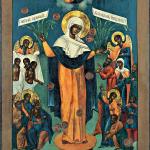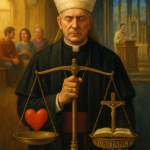LOL AMERICANS: OK, I know it’s unladylike to eavesdrop. But the guys sitting next to me outside Starbucks today were so fascinating!!! I’m not made out of stone, people.
One of them was writing a book about conservatism, or something. He did most of the talking, as his younger interlocutor asked him to elaborate on various points. His basic thing seemed to be tracing the intellectual lineages of various possible conservatisms–e.g. is a Burkean conservatism possible or desirable in the United States? Can Lincoln be a father in a conservative lineage?
I don’t know the answer to these questions. But the conversation made me think a few things, or suspect a few things, and I’d be interested in people’s thoughts. These are scattered, tentative points, not fully-formed in any way, but this is what I’ve got:
1. I’m not sold on Burke really. I’ve learned from him, definitely. But see this post about the problems he shares with Thomas Paine.
2. The talkier guy made the absolutely accurate point that Christianity is not “conservative” within the lineage that goes Burke-(somebody I’m forgetting! Hayek???)-Oakeshott-(Sullivan? The talky guy thought Andrew Sullivan’s new book was squarely within this lineage, i.e. the one Christianity isn’t part of; but I haven’t read it). And so–this is me talking now–the temptation is for the skeptical-tradition-slow-moderationy conservatism to seek to cordon off Christian belief from the political sphere. And you maybe can get away with that sometimes. But I don’t think you can cordon off Christian belief from politics in societies where people disagree on fundamental definitions of justice. (See above re: Lincoln; also, obviously, all kinds of issues today, from abortion to torture to marriage.) Hmm… could you add Aristophanes to this Burke-Oakeshott lineage?
3. Americans are bats crazy. This is my basic argument for why what the talky guy was calling “British conservatism” won’t ever fly here. Americans are utopians. We’re visionaries. We’re strange, son–and unlike the classic British “eccentric,” we want everyone to be weird in our way too. I mean, look at Russell Kirk. He does all this fun stuff about custom, prudence, and assorted whatnot. And then who is his example? John Randolph, a bats crazy man! And what is his ultimate philosophical affiliation (I think–please correct me if this is wrong)? The agrarians–bats crazy nostalgia-utopians, one and all.
I don’t say this pejoratively! I fully own my bats craziness. I’m as American as the rest of them. Americans don’t do compromise. As genres go, we do mythos better than “realism.” We try completely ridiculous stuff like merging Enlightenment rationalism with evangelical Christianity. (We try completely ridiculous stuff like basing our politics on either of those two things.)
There are insights to be gained from our particular breed of crazy. I think both the successes and the failures of the American attempt to merge the Enlightenment and the Gospel can inform the political-philosophy work we need to do now, which is re-founding liberalism on a Christian basis. But I do not think Burke-Kirk-Oakeshott (or even Hayek, who is a somewhat different case) will fly here. The closest you’d get in this country is something like Richard Rorty’s anti-foundationalist metaphysics supporting Virginia Postrel‘s libertarian-dynamist politics. Which would certainly be better than Richard Rorty’s metaphysics supporting Richard Rorty’s politics!–but still, not really good enough.
Okay…. Having said all this fairly uninformed stuff, I will throw the floor open to you people. Am I right? Am I crazy? Is that a dichotomy?
(Two posts on America, for background–I still think these are pretty good–immigration as tragedy, and the blood at the root of American literature.)











